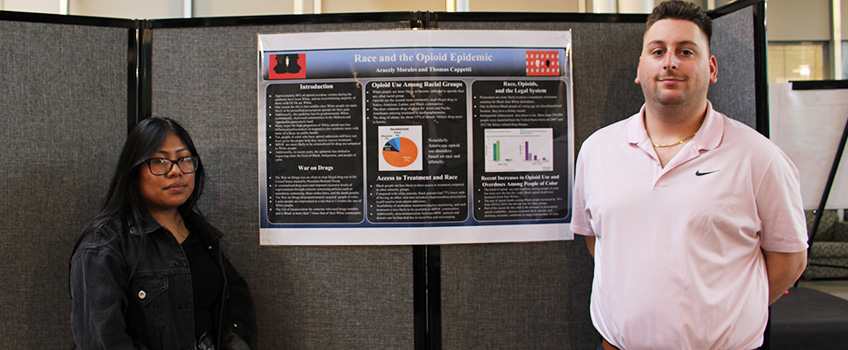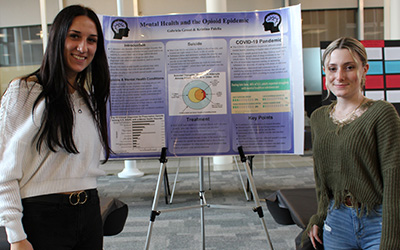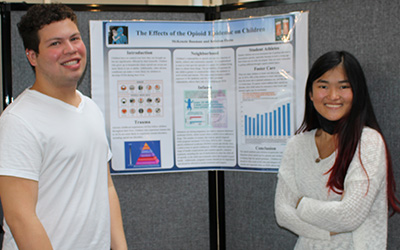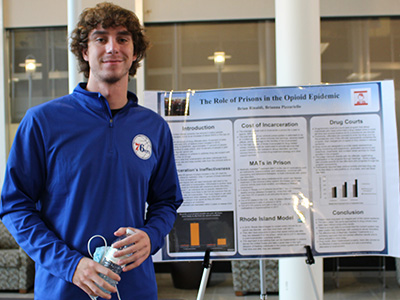Pop-Up Museum Educates on Opioid Epidemic

Galloway, N.J. – While mental health is at an all-time low, the drug epidemic is at an all-time high, with more than 100,000 overdose deaths between April 2020-21, according to the Centers for Disease Control and Prevention.
Gabriela Grossi and Kristina Palella, Stockton University students, were shocked to see how drug addiction skyrocketed during the pandemic. But as students in Associate Professor of Business Studies Kerrin Wolf’s Drug Epidemics class, they helped raise awareness of drug addiction with a pop-up Opioid Epidemic Museum in the C-D atrium.
 Students addressed different topics pertaining to the epidemic, did research and created
a poster based on their topic. They also created a narrative based on someone who
has been affected or has passed away because of addiction. Visitors picked a story
upon entering the museum and followed that person's life narrative. Finally, the
students created artifacts based on their research, ranging from photos of famous
artists affected by drugs to drug court applications, bottles of pills, and a profile
of how pets have been affected by drug use.
Students addressed different topics pertaining to the epidemic, did research and created
a poster based on their topic. They also created a narrative based on someone who
has been affected or has passed away because of addiction. Visitors picked a story
upon entering the museum and followed that person's life narrative. Finally, the
students created artifacts based on their research, ranging from photos of famous
artists affected by drugs to drug court applications, bottles of pills, and a profile
of how pets have been affected by drug use.
Wolf said their goal was to educate others to destigmatize the issues surrounding addiction. The students worked to highlight the legal, family, cultural, and stigma aspects of the epidemic.
Wolf said he wants his students to take three main lessons away from this course: “I hope they understand the nature of drug abuse and drug addiction, understand why drug epidemics occur, and come to a place where they can teach others and spread their knowledge about drug epidemics generally and more specifically about the current opioid epidemic.”
This course looks at the opioid epidemic through health sciences, social sciences, and criminal justice while keeping in mind the real people who are impacted by this crisis.
 “I took this class because my family has been severely impacted by the opioid epidemic.
We have had loved ones who passed away from overdosing,” said student Amanda Clark. “I have artwork from one of my cousins who overdosed on heroin, he was an artist.
I wanted to learn more about the epidemic because of how it affected my family history.”
“I took this class because my family has been severely impacted by the opioid epidemic.
We have had loved ones who passed away from overdosing,” said student Amanda Clark. “I have artwork from one of my cousins who overdosed on heroin, he was an artist.
I wanted to learn more about the epidemic because of how it affected my family history.”
Many of the students didn't realize how widespread this problem is. Others in the class grew up watching friends and family members succumb to drug addiction and saw first-hand how it can affect people's lives.
“The course covered the opioid epidemic in a broad way. I think something interesting that I learned personally was that genetics, environment, and mental health are the key factors on if some people use opioids,” said student Tyler Duncan.
Students were also able to apply their knowledge to real-world solutions, such as getting certified in Narcan training.
Christian Flores, who has personally been affected by the opioid epidemic, said, “The Narcan training was really different. Not only do you get certified, but you get a kit to use in case something ever happens.”
Many students also learned to empathize with people struggling with addiction.
“I just think it's important that people take mental health seriously and realize how many people can be affected in different ways,” said Kristina Palella.
 Kayla Burns agreed. “I think just how widespread and common it is. I didn't realize
that so many people struggle with addiction, and it was just shocking to see how many
social classes and different types of people it can affect. It definitely opened my
eyes to the fact that it really can be anyone.”
Kayla Burns agreed. “I think just how widespread and common it is. I didn't realize
that so many people struggle with addiction, and it was just shocking to see how many
social classes and different types of people it can affect. It definitely opened my
eyes to the fact that it really can be anyone.”
“I think a big thing this class teaches is to be kinder because they are struggling, and they do need help. (The course) addresses a lot of misconceptions about substance use disorder which is very important for recovery rates,” said Gabriella Grossi, who as a health science major, felt this class was fundamental to her education.
The students also learned about treatment programs and how the U.S. is handling the epidemic. Many of the students were shocked to learn how little aid is offered to those struggling with addiction and how often addicts just end up in prison.
“I learned that the health care system doesn't really provide a lot of money to treat opioid use, which is upsetting. It actually is a really big issue that I learned with this class, but the funding just isn't there,” said Mackenzie Bauman.
Overall, students just hoped the museum would educate others about the issues surrounding the epidemic.
“I think it's crazy how without knowledge of it, you see a lot of people just place blame on the people who are addicted,” Grace Sacco said. “But we learned a lot about how addiction can literally start with an injury when you were 16 and because of doctor prescribed pain killers, and now you're addicted to opioids ten years later. It's the empathy side of it and understanding how these things start and how to avoid (getting addicted). Public awareness is definitely an important part of solving the epidemic issue, and this class really covers all different viewpoints of that.”
- Story and photos by Hannah Urbanowycz
# # #
Contact:
Diane D’Amico
Director of News and Media Relations
Galloway, N.J. 08205
Diane.DAmico@stockton.edu
609-652-4593
609-412-8069
stockton.edu/media
Stockton University


